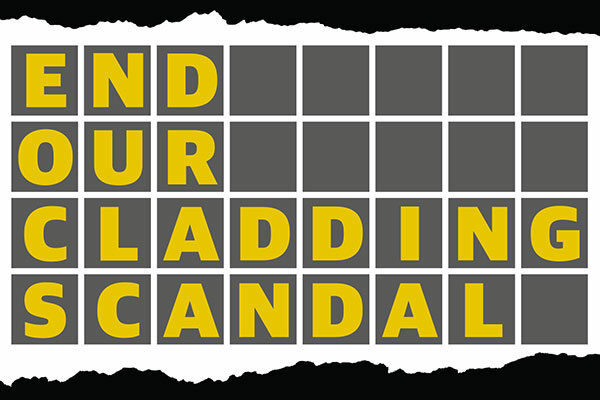Advice Note 14: associations call for clarity on combustibles guidance as residents struggle to sell homes
Social housing landlords have called on the government to provide clarity on its advice around combustible materials on high-rise buildings, as residents have been left unable to sell or remortgage their homes due to cladding issues.
Thousands of leaseholders are trapped as a result of the government’s Advice Note 14 guidance, which calls on building owners of blocks over 18m to check for and remove non-aluminium composite material cladding.
Leaseholders have been left unable to obtain certification that proves their building’s cladding system adheres to Advice Note 14. This has led to mortgage lenders undervaluing flats or valuing them at £0, making it impossible to get a mortgage.
The National Housing Federation (NHF) has urged the government to “provide clarity”, while G15 chair Helen Evans said the government needed to “unstick the process” and explore funding the works.
Lord Kerslake, chair of Peabody, called for the government’s 22 advice notes to be consolidated into a single document.
The comments came as the G15, which represents London’s 12 largest associations, revealed that 650 families living in their blocks are unable to sell or remortgage their homes because of the government’s advice. Labour estimates that 600,000 flat owners in private and housing association blocks could be affected.
Inside Housing has spoken to several leaseholders and shared owners who are unable to sell and have been hit by higher mortgage costs due to Advice Note 14. The problem of securing certification is being exacerbated by the lack of fire engineers able to carry out inspections. There are also issues around engineers obtaining public liability insurance.
Victoria Moffett, head of building and fire safety programmes at the NHF, said the work for associations to check buildings and carry out remedial work could take “up to a decade” and it is unacceptable that leaseholders have to put their lives on hold through no fault of their own.
Debbie Larner, head of knowledge and products at the Chartered Institute of Housing, said resource issues meant that associations were having to make “challenging decisions” about which buildings to prioritise.
The G15 has predicted that in London, fire remediation work could cost its members £6.9bn.
Private house builders have also raised concerns about the impact the advice may have on the mortgage market and housing sector.
A spokesperson for the Home Builders Federation said: “New homes are built to today’s building regulations and so are not affected by the zero valuations issue and house builders do not tend to own the freeholds on buildings once completed.
“That said, the issue poses significant concerns and we are part of the Royal Institution of Chartered Surveyors working group and are keen to ensure that the guidance provided gives lenders the necessary certainty to address the current situation.”
End Our Cladding Scandal general election campaign: full coverage
The cladding scandal is far from over. Here’s why we need a fresh approach
Click here to read the full story
Ahead of the general election, Inside Housing revisits our national cladding scandal and sets out what needs to be done to prevent any further tragedies. Peter Apps reports.
The cladding crisis Down Under: what we can learn from the response to Grenfell in Australia
Click here to read the full story
Five years ago a fire spread up Grenfell-style ACM cladding on a high-rise in Melbourne. This prompted an overhaul of the Australian state of Victoria’s building safety regime. Peter Apps finds out what the UK could learn.
More than 100,000 buildings outside scope of fire safety measures, minutes reveal
Click here to read the full story
There are more than 100,000 medium-rise homes that fall outside new regulations aimed at making buildings safe in the aftermath of Grenfell, including the ban on combustible cladding, Inside Housing can reveal.
It’s only a matter of time until the next Bolton unless the parties step up to the plate on fire safety
Click here to read the full story
Inside Housing’s new election campaign calls on the main political parties to commit to taking action to prevent what currently seems like an inevitable further tragedy. It’s time for everyone to step up, writes Martin Hilditch.
Leaseholders fear missing out on £200m cladding fund as bidding deadline approaches
Click here to read the full story
Leaseholders living in blocks seeking government funding for the removal of Grenfell-style cladding have raised concerns over meeting the deadline for applications, while criticising the lengthy process being run by the government.
Government refusing to test polystyrene panels, despite request from London boroughs
Click here to read the full story
The government has no further plans to carry out testing of cladding products despite a specific request from London boroughs to test systems comprising polystyrene, a document obtained by Inside Housing has revealed.













